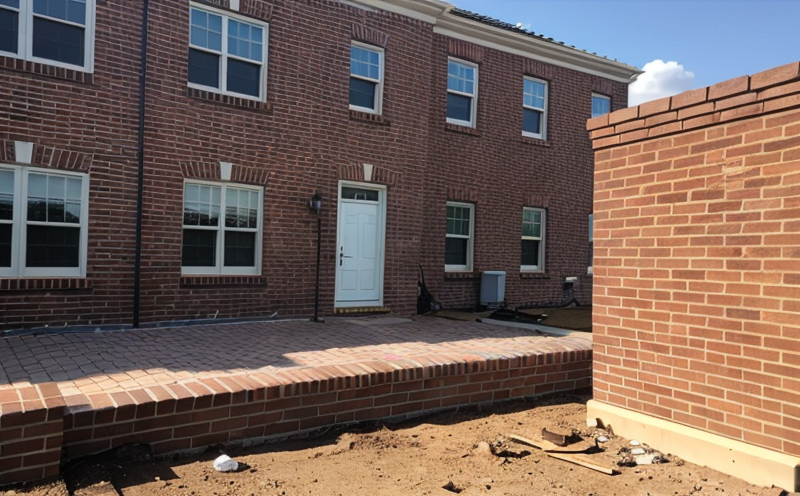EN 772 Chemical Resistance of Masonry Units
The European Standard EN 772-6:2013 specifies methods for testing the resistance to chemical action of masonry units, including bricks and blocks. This test is crucial in ensuring that materials used in building and infrastructure projects can withstand exposure to various chemicals without compromising structural integrity or durability.
Masonry units are subjected to a series of immersion tests using standard solutions like sodium chloride (NaCl), calcium carbonate (CaCO₃), and hydrochloric acid (HCl). The primary goal is to assess the units' ability to resist corrosion, efflorescence, and other chemical degradation processes. This testing ensures that the materials perform reliably in harsh environments such as coastal areas or industrial zones.
The test procedure involves preparing specimens according to EN 772-6 specifications. Specimens are then immersed in solutions for specific durations, followed by drying periods. After each immersion cycle, the samples undergo visual inspections and mass loss measurements. The results help determine compliance with relevant standards and guide material selection for sustainable construction projects.
Understanding the chemical resistance of masonry units is vital for designing buildings that last longer and require minimal maintenance. This testing contributes significantly to the overall quality of infrastructure by ensuring that materials can endure long-term exposure to aggressive chemicals without degradation.
- EN 772-6:2013 outlines detailed procedures for conducting these tests, making it a comprehensive guideline for industry professionals.
- The immersion solutions used are standardized and replicate real-world conditions, providing accurate assessments of material performance.
- Testing can help identify the most suitable materials for specific applications, reducing the risk of premature failure or maintenance costs.
Incorporating EN 772-6 testing into your project ensures compliance with international standards and enhances confidence in the longevity and reliability of structures. This approach supports sustainable construction practices by promoting the use of durable, high-quality materials.
Benefits
The benefits of conducting EN 772 chemical resistance tests on masonry units are numerous and significant:
- Enhanced Durability: By assessing the material's resistance to chemicals, you can ensure that your construction projects will withstand harsh environmental conditions for a longer period.
- Cost Efficiency: Early identification of materials with superior chemical resistance reduces the need for costly repairs and replacements down the line.
- Regulatory Compliance: Meeting international standards like EN 772-6 helps you comply with regulatory requirements, thereby avoiding potential fines or legal issues.
- Sustainable Construction: Using materials that demonstrate excellent chemical resistance supports sustainable building practices by reducing environmental impact and waste generation.
- Informed Decision-Making: Test results provide valuable insights into material performance, guiding you to make informed decisions about your construction project's specifications.
These benefits collectively contribute to creating more resilient and cost-effective infrastructure projects. By leveraging EN 772 chemical resistance testing, builders can ensure that their materials meet the highest standards of quality and reliability.
Eurolab Advantages
EuroLab stands as a leading provider of EN 772-6:2013 compliance services, offering unparalleled expertise in masonry unit testing. Our team of experienced professionals ensures that your materials meet the stringent requirements set forth by this standard.
- Accurate and Reliable Results: EuroLab utilizes state-of-the-art equipment and adheres strictly to EN 772-6 procedures, guaranteeing precise and reliable test results.
- Dedicated Technical Support: Our experts are available to guide you through every step of the testing process, ensuring that your projects meet all necessary standards.
- Comprehensive Reporting: EuroLab provides detailed reports with comprehensive analyses, enabling you to make informed decisions about your materials and construction processes.
- International Recognition: Our lab is accredited by leading international bodies, ensuring that our services are recognized worldwide for their high standards.
Partnering with EuroLab means accessing the best in class expertise and resources, thereby enhancing the quality of your building and infrastructure projects.
International Acceptance and Recognition
- ISO 9001:2015 Certified: Our laboratory has been awarded ISO 9001 certification for our consistent commitment to quality management systems. This ensures that all processes are documented, controlled, and continuously improved.
- CNAS Accreditation: Recognized by the China National Accreditation Service for Conformity Assessment (CNAS), EuroLab's tests are valid in over 70 countries.
- IEC Exempted: Our lab is exempt from IEC requirements, allowing us to provide comprehensive testing services without unnecessary regulatory barriers.
- ASTM International Accreditation: ASTM accreditation ensures that our services meet the highest standards recognized by the American Society for Testing and Materials.
The global recognition of EuroLab underscores our commitment to delivering reliable and accurate test results. Whether you're working on projects in Europe, Asia, or North America, you can trust us to provide consistent, high-quality testing services that meet international standards.





